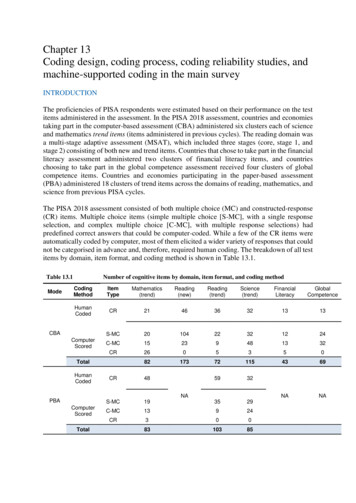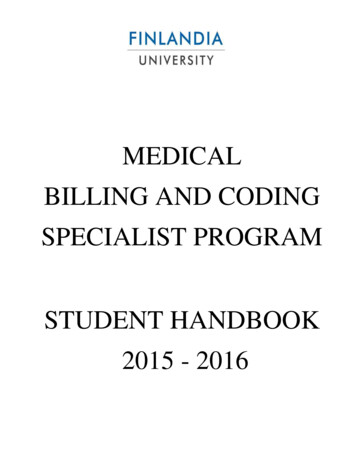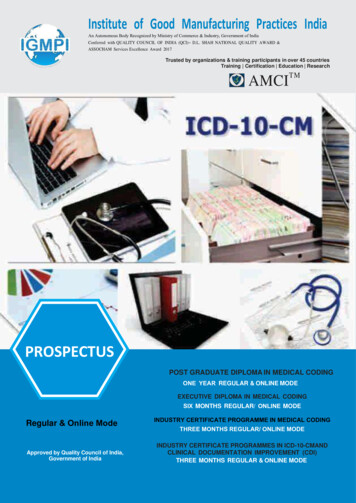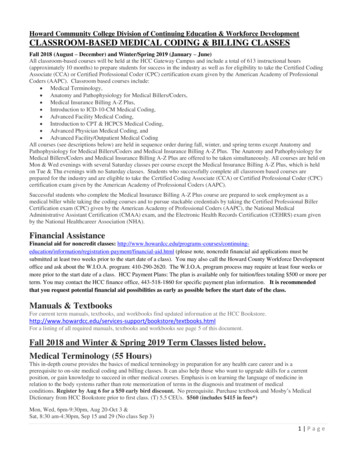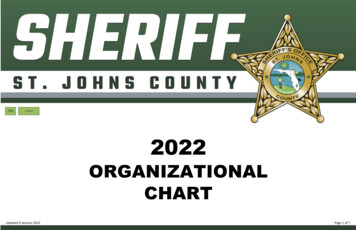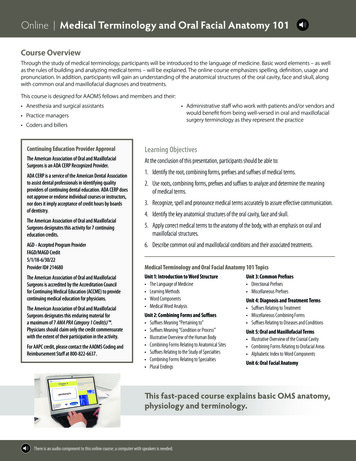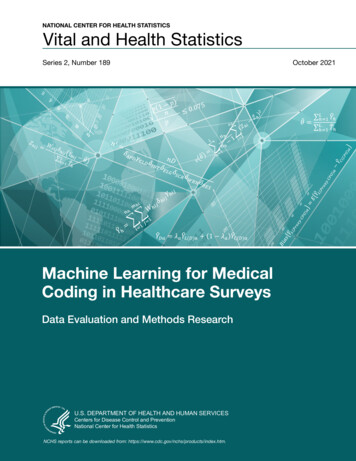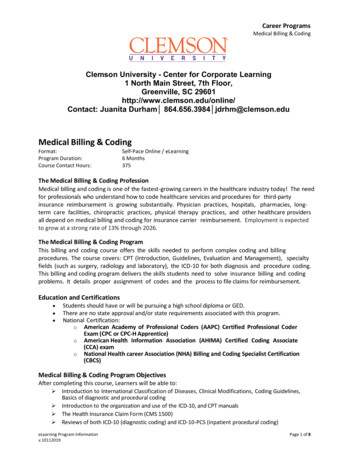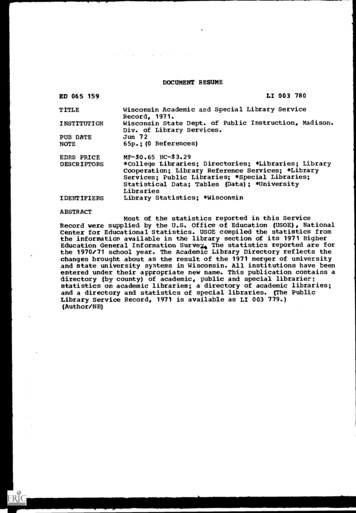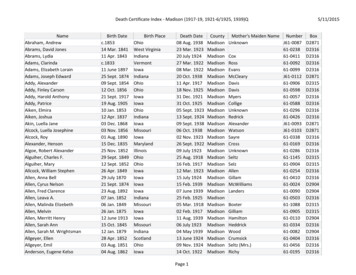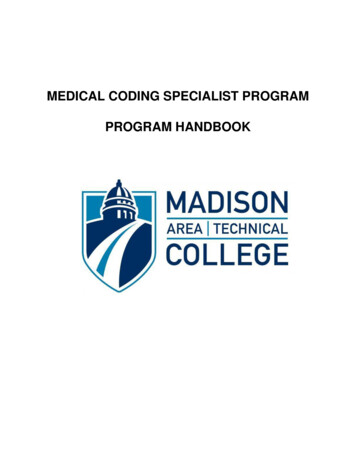
Transcription
MEDICAL CODING SPECIALIST PROGRAMPROGRAM HANDBOOK
FORWARDThe Medical Coding Specialist Program Handbook provides students with a descriptionof the program – its framework, program goal and description, program outcomes, andpolicies.The policies provided in this handbook are in effect throughout the program andsupplement the policies and procedures published on the Madison College website.Please retain this handbook for reference until completion of the Medical CodingSpecialist Program.Developed: May 2011Latest Revision: April 20201
PROGRAM GOAL AND DESCRIPTIONThe Medical Coding Specialist Program (MCSP) prepares individuals for employmentas entry-level coding specialists in health care facilities such as hospitals, clinics,physician practice groups, surgery centers, long-term care facilities, and home healthcare agencies. Coding specialists are also employed in consulting firms, coding andbilling services, insurance companies, governmental agencies, and computer softwarecompanies.The medical coding specialist reviews medical documentation provided by thephysicians and other health care providers and translates this into numeric codes. Thecoding specialist assigns and sequences diagnostic and procedural codes usinguniversally recognized coding systems. Several uses of coded data are for payment ofhealth care claims, statistics, and medical research.PROGRAM OUTCOMESUpon completion of the program, the student will have the knowledge, skills, andprofessional behavior to enter the medical coding profession. The specific programoutcomes are:1.2.3.4.Collect health data.Apply coding and reimbursement systems.Model professional behaviors and ethics.Use electronic applications to support coding and data collection.MEDICAL CODING SPECIALIST PROGRAM FACULTY AND STAFFDean of the School of Health Education608-246-6065Room 103 – Health Education BuildingRhonda Voelz, Program Director & Faculty608-246-6015rvoelz@madisoncollege.eduRoom 212 L – Health Education BuildingLoretta Brunell, Full Time Faculty608-246-6511lbrunell@madisoncollege.eduRoom 212 M – Health Education BuildingJulie Dean, Part Time Facultyjadean1@madisoncollege.eduChelsey Bauer, Academic Advisor608-246-6076 (appointments)cbauer4@madisoncollege.eduadvising @madisoncollege.eduStudent Development & Retention ServicesMain Building – Truax Campus2
PROGRAM INFORMATION AND POLICIESThe following program information and policies are arranged by subject in alphabeticalorder. The appendices are at the back of the Handbook.ACADEMIC ADVISINGAcademic advising is available to all students from the Academic Advisors in theStudent Development Center and from the Medical Coding Specialist Programinstructors. Academic advising will promote success in the program by making surestudents are placed in the correct courses needed for graduation. The DegreeProgress Report (Academic Advising Report) is available online in the student’s“myMadisonCollege” Student Center account. Advising will also help students schedulecourse loads that are appropriate for their lifestyle; in other words, advisors will helpstudents look at their school, work, and family responsibilities and the time needed foreach.Contact the Student Development Center to make an appointment with an AcademicAdvisor: https://madisoncollege.edu/advisingACADEMIC INTEGRITYAcademic integrity is expected in all Madison College classes and in the clinical sites.Cheating, plagiarism, falsifying work, and other forms of academic dishonesty areprohibited. (Plagiarism is defined as passing of another person’s work as your own.)Students are obligated to conduct academic work with honesty and integrity accordingto Madison College standards. Student who fail to observe these standards are subjectto disciplinary action which may include dismissal from the Medical Coding SpecialistProgram.For more information, please refer to the Madison College website MISSION PROCESSPlease refer to the information about the admission process on the Medical CodingSpecialist Program webpage at: Click on the Admission tab for details.ADVANCED STANDING – TRANSCRIPTED CREDIT (TRANSFER CREDIT)Courses taken at Madison College or at another college or university may fulfill some ofthe requirements for the Medical Coding Specialist Program. To have these coursesconsidered for advance standing, you must have official transcripts sent to the Madison3
College Enrollment Center. If you do not see anticipated transfer credit populated intoyour student record, you must complete the Transfer Credit Evaluation Request Formand submit the course syllabus for the desired course(s). This form can be found on theMadison College website at: https://madisoncollege.edu/transcripted-creditThe Transfer Credits staff will review the transcript and course syllabus to grant credit ifappropriate; transcript must document a grade of “C” or better. Credit will only begranted for courses if they are less than five years old at the time your applicationis processed.Credit for the coding courses (ICD Diagnosis Coding, ICD Procedure Coding, CPTCoding, Advanced ICD Coding, and Advanced CPT Coding) cannot be transferred fromanother program, college, or university. The coding courses must be taken at MadisonCollege or credit must be obtained by successfully passing a challenge exam (test-out).As documented in the credit for prior learning policies and procedures on the MadisonCollege website, credits from prior learning (transfer or otherwise) may account for up to75 percent of requirements toward a degree.ADVANCED STANDING – EXPERIENTIAL CREDIT (CHALLENGE EXAM)Students may obtain credit for a specific course by successfully completing thechallenge exam. The challenge exam must be taken prior to the beginning of thecourse and cannot be taken if the student has withdrawn from or failed the coursepreviously. The cost is 50 per exam.A challenge exam is available for Windows. For more information, please see theExperiential Learning page on Madison College’s website g. If you have questions about theWindows challenge exam, please call the Business Technology Lab at (608)-243-4019.Challenge exams are available for Body Structure & Function and Medical Terminology.For more information, please see the Experiential Learning page on Madison College’swebsite at: https://madisoncollege.edu/experiential-learning. If you have questions,please contact Amy Lemkuil at alemkuil@madisoncollege.edu or by phone at 608-2465283 for more information.Please contact Rhonda Voelz, Medical Coding Specialist Program Director, to makearrangements for taking a challenge exam for the core program courses in the MCSP.Contact Info: rvoelz@madisoncollege.edu or 608-246-6015Students may obtain credit for Certification and Professional Development (10-530-188)by showing proof of current coding certification from either the American HealthInformation Management Association (CCA, CCS, CCS-P) or the American Academy ofProfessional Coders (CPC, COC, CIC).4
As documented in the credit for prior learning policies and procedures on the MadisonCollege website, credits from prior learning (transfer or otherwise) may account for up to75 percent of requirements toward a degree.ATTENDANCECore program courses in the MCSP are offered in either the FlexChoice or Onlineformats. FlexChoice provides the student the choice to attend face/face class sessionsor complete the course work online or a combination of both. Because of these formats,attendance is not taken and recorded for the face/face class sessions. Students areexpected to fully participate and meet the deadlines as posted by the instructor.CELL PHONESCell phones must be silenced during classroom sessions.CERTIFICATIONThere are several certification exams that can be taken to earn national codingcredentials. The Certified Coding Associate (CCA) exam demonstrates entry-levelskills. The other certification exams demonstrate mastery level (experienced) skills.Some employers require certification. Certification may result in a salary increaseand/or promotion. The certification exams are as follows:American Academy of Professional Coders (AAPC)Certified Professional Coder (CPC)Certified Outpatient Coder (COC)Certified Inpatient Coder (CIC)Certified Professional Coder – Payer (CPC-P)Certified Risk Adjustment Coder (CRC)American Health Information Management Association (AHIMA)Certified Coding Associate (CCA)Certified Coding Specialist (CCS)Certified Coding Specialist – Physician-Based (CCS-P)COMPUTER APPLICATIONS AND ELECTRONIC HEALTH RECORDBlackboard is the course management system used by Madison College to supplementface/face courses and to deliver online courses. Blackboard is accessed via the Internet.During the core-program courses, students will use an electronic health record called EHR Goand coding/reimbursement software in the AHIMA Virtual Lab. Access codes for thesesoftware products will be purchased by the College and distributed to the students.5
Madison College Student Help Desk is available to assist students with technical issues(computer, Blackboard, email, etc.). Technology related issues are not an excuse for beinglate with or missing assignments, quizzes, exams, etc. Occasionally technical problems occurwith Blackboard and Internet connections. If problems occur while a student is taking aquiz/exam and the Bb connection is disrupted, the student may request the instructor to resetthe quiz/exam in order to continue. If this occurs on a consistent basis (multiple times), thestudent will be asked to come to the Madison College campus (main campus or regionalsatellites) to take the quizzes/exams.CONFIDENTIALITY AND PRIVACY OF HEALTH INFORMATIONThe Medical Coding Specialist Program at Madison College uses de-identifiedelectronic health records. Although the records have been de-identified, the studentsand faculty have the legal and ethical responsibility to safeguard the privacy of allpatients and protect the confidentiality of their health information. Students must onlyaccess the patient confidential information for which they have a need to know in thecontext of their role as a student.Students must adhere to the Health Insurance Portability and Accountability Act of 1996(HIPAA). Violation of patient privacy and confidentiality may result in corrective action up toand including withdrawal from the Medical Coding Specialist Program.COURSE PREREQUISITES OR CO-REQUISITESKnowledge gained in certain courses in the program is a prerequisite or co-requisite forsubsequent courses. Prerequisite refers to a course(s) that must have beensuccessfully completed prior to the current course. Co-requisite means that a course(s)can be taken concurrently with the current course. Prerequisites must have beentaken within the past five years. Please see Appendix A for a listing of the coursesand prerequisite/co-requisites.CURRICULUMPlease see Appendix B for the Medical Coding Specialist Program curriculum.DELIVERY/INSTRUCTIONAL FORMATMany of the core program courses are offered in the FlexChoice format. This delivery formatwas designed for individuals who need flexibility in completing their coursework by allowing thestudent to alternate between classroom-based instruction, online instruction, or a combinationof classroom and online as needed throughout the program. Students may choose whether tocome to Truax campus Health Education and IT Building during the scheduled class time(classes offered at 4:00PM or later) or to complete activities online at a time convenient for the6
student or a combination of both.FlexChoice courses use Blackboard (a learning management system) to facilitate class work;therefore students need basic computer and keyboarding skills to be successful. Thefollowing core program courses are offered in a FlexChoice format: Foundations of HIMICD Diagnosis CodingICD Procedure CodingCPT CodingAdvanced ICD CodingAdvanced CPT CodingThe following core program courses are offered online only: Human Diseases for the Health ProfessionsHealth Care ReimbursementManagement of Coding ServicesCertification and Professional DevelopmentPlease note that some courses require the student to come to the Truax campus to take theproctored final examination even if the student has taken the course online. Please refer to thecourse syllabus at the beginning of each course to learn about the final exam requirements.Before your online or FlexChoice classes begin, please prepare for flexible learning andreview online learning etiquette. To do so, please refer to Madison College’s websiteat: https://madisoncollege.edu/flexible-learningThe course delivery format is subject to change due to pandemics, natural disasters, orinstructor availability.DISABILITY RESOURCE SERVICES (DRS)Madison College welcomes students with disabilities into the College’s educationalprograms. Every Madison College campus has Disability Resource Services availablefor students with disabilities. The Disability Resource Services website provides specificinformation related to accommodations for disability-related barriers. For furtherinformation, please visit the vices,call 608-246-6716 (Students who are deaf should use relay) oremail DRStransition@madisoncollege.edu.In order to receive consideration for reasonable accommodations for your disability, youmust contact the Disability Resource Services office at the campus where you areofficially enrolled. If approved for accommodations, Disability Resource Services willprovide you with an accommodation plan. The student should share the7
accommodation plan with each instructor and discuss the accommodations needed.This should be done before or at the start of each semester so there is ample time tomake the accommodations.EMAIL – OFFICIAL COMMUNICATIONThe official means of communication with students is via the student’s Madison College emailaccount. Please check your Madison College email on a regular basis for importantinformation. When communicating with instructors and other Madison College staff, pleaseuse your Madison College email instead of your personal email.Learn more at: GLISH LANGUAGE LEARNERS (ENGLISH AS A SECOND LANGUAGE)Students in the Medical Coding Specialist Program need to have proficient skill in usingEnglish in oral and written communication. Mastery of the English language is also necessaryfor comprehension of written materials including the textbooks. The medical language(medical terminology) seems like a second language in the MCSP and students who do nothave a solid foundation in English may find it difficult to use two new languages (English andmedical) at the same time.ESSENTIAL FUNCTIONSPlease see Appendix C for the Essential Functions of the Medical Coding Specialist.FAILURE OF OR WITHDRAWL FROM A COURSEStudents must receive a “C” (76%) or better in all courses in the Medical Coding SpecialistProgram (MCSP). If a student receives less than a “C”, he/she must repeat the course. Effortwill be made to place the student in the upcoming cohort to retake the core program course thefollowing semester. If space is not available or the needed course is not offered the followingsemester, the student may need to reapply to the MCSP and petition to be accepted again tohave access to the core program courses.If a student formally withdraws from a core program course effort will be made to place thestudent in the upcoming cohort to retake the core program course the following semester. Ifspace is not available or the needed course is not offered the following semester, the studentmay need to reapply to the MCSP and petition to be accepted again to have access to the coreprogram courses.If a student has failed/withdrawn from a core program course twice and would like to registerfor the course for the third time, he/she needs to complete the following steps to help ensuresuccess the third time the course is taken:8
Meet with an academic advisor in the Student Development Center anddevelop an academic plan. The Program Director and Dean of the Schoolof Health Education may be included in this discussion. Complete the Time Tool in Appendix F of the MCSP Handbook. Share this time tool withthe academic advisor.If a student has failed/withdrawn from a core program course three times, whether ornot this occurred in consecutive semesters, he/she will be removed from the program.FINAL EXAMINATIONS – PROCTOREDSome of the courses in the Medical Coding Specialist Program have proctored finalexaminations. Even if the course is taken online, there may be a proctored final examinationthat the student needs to take in person at the Truax campus. Please refer to the coursesyllabus for each course at the beginning of the semester to learn about final examinationrequirements.If a student lives more than 60 miles from the Madison College Truax campus and is not ableto take the final examination given by the instructor on campus, he/she will need to makearrangements for a proctor. The student should contact the instructor for instructions to obtaina proctor. Arrangements must be made at least two weeks before the final exam.GAINFUL EMPLOYMENTStudents have a right to know about gainful employment after graduation. Madison College isrequired by regulations to tell students about programs eligible for financial aid and theiroutcomes. Gainful employment reports inform students of the program costs, financing, andgraduate success. This data may help you choose a program based on career and incomepotential and avoid unnecessary debt. Learn more at: https://madisoncollege.edu/dataStudents must receive a “C” (76%) or better in all the courses in the Medical Coding SpecialistProgram. The following grading scale is -85%76-80%70-75%69% and belowPlease refer to individual course syllabi and/or Blackboard sites for specific details on9
grading policies including make-up work, credit for late work, participation in groupactivities, etc.MADISON COLLEGE WEBSITEThe Madison College website (www.madisoncollege.edu) provides a wealth ofinformation at your fingertips! The Madison College website includes informationregarding counseling and disability resource services; financial aid; registration andrecords (withdrawals, refunds, grading, etc.) and general school information.Special attention should be given to the information about student rights andresponsibilities (code of conduct, grade disputes, appeals process, etc.) Thewebsite also contains information about each program of study and the coursedescriptions.Students must activate their “myMadisonCollege” student center account. From“myMadisonCollege”, students can do such things as access grades and transcripts,register for and withdraw from classes, check their class schedule, make accountpayments, change their address and phone information, access Blackboard for onlinecourses, and check their Madison College email. The date when students may beginregistering for classes for the next session/semester is posted in each student’s“myMadisonCollege” account.Learn more at: https://madisoncollege.edu/student-accountOPEN LAB FOR MEDICAL CODING STUDENTSRoom 233 in the Health Education and Information Technology Building is open tostudents on Monday-Thursday from 3:00 – 4:00 pm. This open lab is staffed by aMCSP faculty. Students can come in during this time to ask questions, receive helpfrom faculty and peers, and work together with other students.ORIENTATION TO THE PROGRAMStudents are required to complete a short online Medical Coding Orientation/PetitionWorkshop course once their application has been processed. Completion is required inorder for students to petition to begin core program courses. Students will be notifiedand provided instructions to begin the online orientation course after their applicationhas been processed.Students will be required to complete a time commitment survey and a short quiz in theonline orientation course. This is verification that the student has completed theorientation and has received the necessary program information. The following is thelast question in the quiz; this serves as verification that the policies and procedureshave been reviewed:I have received an electronic copy of and read the Medical Coding Specialist Program10
(MCSP) Handbook. I have retained a copy, either electronically or in paper, for futurereference. I understand additional policies and procedures are contained on theMadison College website and in individual course syllabi and Blackboard sites.I understand failure to abide by the Madison College and MCSP policies andprocedures may result in disciplinary action including dismissal from the MCSP.PRE-PETITION STATUS AND PETITION PROCESSAfter the initial application is processed, students are placed in the pre-petition status.During this time, students will need to: Complete the program’s prerequisite requirements for Algebra, English, andReading Complete the pre-petition course requirements (Windows, Digital Literacy forHealthcare, Body Structure & Function, and Medical Terminology). Please notethese courses have a five-year time limit. Complete the online Medical Coding Orientation/Petition Workshop course inBlackboardPlease refer to the detailed instructions at: https://madisoncollege.edu/petition-processThe petition process is the method that students follow to tell Madison College whenthey are ready and prepared to begin the core program courses (Clusters 1-3). Of thestudents who petition, twenty (20) will be selected to begin Cluster 1 core programcourses each semester. Priority for entry into core program courses will be given tothose students who have all requirements completed at the time of petitioning. If allspots are not filled by students who have all the petition requirements completed, theremaining petitions will be reviewed and any open spots will be tentatively awarded toqualified petitioners who are in-progress with the remaining requirements. Thetentatively awarded spots will become permanent only after the student successfullycompletes the remaining in-progress requirements.Students can monitor their petition requirement completion through their StudentCenter’s advising report/degree progress report. Students can contact Chelsey Bauerat cbauer4@madisoncollege.edu or advising@madisoncollege.edu or call 608-2466076 to schedule an appointment if there are any questions.Please see the detailed instructions on how and when to petition DULESPlease see Appendix E for the class schedule for the core program courses. Studentsare required to take the core program courses cluster by cluster (Cluster 1 before11
Cluster 2; Cluster 2 before Cluster 3). The courses for each cluster should be takentogether in the same semester.SYLLABUSA course syllabus is prepared for each course in the program. The following informationis commonly found in the course syllabus: course number, title and description, credits,course competencies, required textbooks, instructor information, and a course timeline.The syllabus also includes course policies related to academic accommodations,attendance, and grading. It is the student’s responsibility to read and understand thecourse syllabus for each course. The course syllabus is posted on the Blackboard sitefor each course.TIME COMMITMENTSuccess in the Medical Coding Specialist Program (MCSP) requires a major timecommitment – going to college is almost like a full-time job. A general rule of thumb isthat students should expect to devote a minimum of 3 hours per week for each coursecredit. For example, a 3-credit course requires a minimum of 9 hours of time per week.This varies a little because some courses have laboratory components that requireextra time. Of course, there are many variables that affect the time commitment neededfor success in each course. Some of these include the student’s prior educational andwork experience, study habits, learning style, ability to process and retain informationand ability to study in a quiet, uninterrupted manner.Please refer to Appendix F for the time commitment required for the courses/clusters inthe MCSP.WITHDRAWAL FROM A COURSEIt is strongly recommended that a student who desires to withdraw from a coursediscuss the withdrawal with his/her instructor prior to doing so. It is the responsibility ofthe student to officially withdraw; a student may withdraw online through his/her“myMadisonCollege” student center account.If a student formally withdraws from a core program course effort will be made to place thestudent in the upcoming cohort to retake the core program course the following semester. Ifspace is not available or the needed course is not offered the following semester, the studentmay need to reapply to the MCSP and petition again to have access to the core programcourses.If a student has failed/withdrawn from a core program course twice and would like to registerfor the course for the third time, he/she needs to complete the following steps to help ensuresuccess the third time the course is taken: Meet with an academic advisor in the Student Development Center and12
develop an academic plan. The Program Director and Dean of the Schoolof Health Education may be included in this discussion. Complete the Time Tool in Appendix F of the MCSP Handbook. Share this time tool withthe academic advisor.If a student has failed/withdrawn from a core program course three times, whether ornot this occurred in consecutive semesters, he/she will be removed from the program.13
APPENDIX A – COURSE PREREQUISITES OR CO-REQUISITESKnowledge gained in certain courses in the program is a prerequisite or co-requisite forsubsequent courses. Prerequisite refers to a course(s) that must have beensuccessfully completed prior to the current course. Co-requisite means that a course(s)can be taken concurrently with the current course.Red – Pre-Program (Pre-Petition) CoursesGreen – Cluster 1 Core Program CoursesBlue – Cluster 2 Core Program CoursesOrange – Cluster 3 Core Program CoursesCoursePrerequisiteCo-requisite10-103-121 – Windows 10NoneNone10-501-107 – Digital Literacy for HealthcareNoneNone10-501-153 - Body Structure & FunctionNoneNone10-501-101 - Medical TerminologyNoneNone10-530-162 – Foundations of CoursesCluster 1CoursesCluster 1CoursesCluster 1CoursesCluster 1CoursesCluster 2CoursesCluster 2CoursesCluster 2CoursesOther Cluster 1CoursesOther Cluster 1CoursesOther Cluster 1CoursesOther Cluster 2CoursesOther Cluster 2CoursesOther Cluster 2CoursesOther Cluster 2CoursesOther Cluster 3CoursesOther Cluster 3CoursesOther Cluster 3Courses10-530-182 – Human Diseases for the Health Professions10-530-197 – ICD Diagnosis Coding10-530-199 – ICD Procedure Coding10-530-184 – CPT Coding10-530-159 – Healthcare Revenue Management10-530-189 – Management of Coding Services10-530-168 – Advanced ICD Coding10-530-187 – Advanced CPT Coding10-530-188 – Certification & Professional Development14
APPENDIX B - MEDICAL CODING SPECIALIST PROGRAM CURRICULUM (31-530-2)The Medical Coding Specialist Program is offered on a part-time basis only. Pre-program (pre-petition)courses must be successfully completed before the student begins the core program courses. Coreprogram courses must be taken in clusters as listed below.Most of the courses are offered in either the FlexChoice or Online format. FlexChoice allows the studentto attend face/face sessions or complete the course online or a combination of both.Pre-Program (Pre-Petition) Courses – Students are required to take these courses before they beginthe core program 3-12110-501-107Body Structure and Function ORGeneral Anatomy & Physiology**Medical TerminologyWindows 10Digital Literacy for HealthcareCredits3(4)312Lec-Lab Hours/Week3-0(3-2)3-0.25-1.51-2**General Anatomy and Physiology is recommended for those who plan to pursue an associate degreeand/or a bachelor’s degree.Core Program Courses – Students are required to take these courses cluster by cluster (Cluster 1before Cluster 2; Cluster 2 before Cluster 3). The courses for each cluster must be taken together in thesame semester.Cluster 1:10-530-16210-530-18210-530-197Foundations of HIMHuman Diseases for the Health ProfessionsICD Diagnosis Coding3332-23-02-2ICD Procedure CodingCPT CodingHealth Care ReimbursementManagement of Coding Services23311-22-22-21-0Advanced ICD CodingAdvanced CPT CodingCertification and Professional Development3322-22-21-2Cluster 2:10-530-19910-530-18410-530-18510-530-189Cluster 3:10-530-16810-530-18710-530-188Total Credits3515
APPENDIX C - ESSENTIAL FUNCTIONS OF THE MEDICAL CODING SPECIALISTDuring the course of the Medical Coding Specialist Program, students must demonstrate, with or withoutreasonable accommodations to policies and practices, the ability to perform the functions listed belowsafely, reliably, and efficiently.ISSUESTANDARDEXAMPLESCritical ThinkingCritical thinking ability sufficient forclinical judgment and professionalbehavior. ReadingAbility to read and understandwritten documentation.EmotionalEnduranceAbility to work in a high stress andrapidly changing environment withmultiple deadlines while maintainingemotional control and flexibility.InterpersonalSkillsInterpersonal abilities sufficient tointeract with peers, coworkers,physicians, third party payers, andother groups from a variety of social,emotional, cultural, and intellectualbackgrounds.Ability to communicate and interactwith others.Communication EthicsAbility to act in a professionalmanner.Motor SkillsManual dexterity and phys
The medical coding specialist reviews medical documentation provided by the physicians and other health care providers and translates this into numeric codes. The coding specialist assigns and sequences diagnostic and procedural codes using universally recognized coding systems. Several uses of coded data are for payment of
